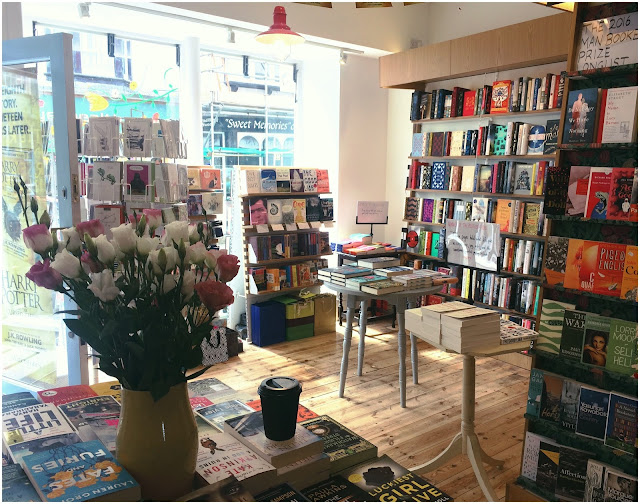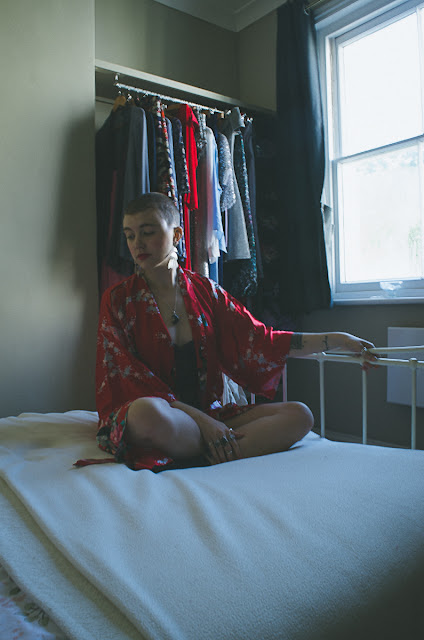Another Place; a Q&A with Matthew Crow.
Matthew
Crow's 'Another
Place' (published August 3rd), is his latest novel that follows the beautiful, genre-defying and much-praised 'In
Bloom' (2013).

Was it different writing this novel, compared to your other books?

'Another
Place', takes us to a strange and sad seaside town, where one girl is
trying to put herself back together, and another girl has gone
missing.
The story centres
around sixteen-year-old
Claudette Flint, who is released into the care of her dad after a
stay in hospital with depression. She is told that to
continue getting better she must set small goals for each day, larger
ones for each week, and one significant thing to aim for.
Meanwhile, the close-knit community of her town seems to be
falling apart in the wake of the sudden disappearance of one of her
school mates - and secret friend - Sarah. Everyone knew Sarah; and at the same time,
nobody knew her at all. But Claudette can understand her in ways that
others didn’t. She soon decides what
will be her one overarching aim in life: finding Sarah.
Hi,
Matthew! Thanks so much for doing this Q&A with me. I recently
finished 'Another Place' and am so excited for everyone I know to
read it, too.
There
are so many things I wanna know about this story and your writing
process...
Firstly,
where did this story come from?
The
character, Claudette. The same way all my books do. I had the idea
for Claudette- her voice, her temperament, and maybe one or two
little lines of hers here and there. And the rest sort of built
itself around that. I decided early on that I wanted to use Claudette
to write about mental health issues, as it is something I’ve always
found interesting. Plus, having been on various cocktails of
antidepressants since I was a kid, felt it time for some fucking
cashback to be quite honest. Then the sense of location came through
very quickly, too. The idea of a seaside town that had been ravaged
by changes in times and tastes and left to rot- much like the ones I
grew up in and around. The mystery aspect came about last and very
gradually. I wanted Claudette to be released into a version of her
world that wasn’t quite hers. Like the sort of dream houses you get
sometimes, when you open a door that was never there before? So
initially the book was going to be purely the story of her recovery
set against the backdrop of a police investigation/ media deluge;
mainly to further the feeling of displacement, the idea that even
your home isn’t your home anymore for a while after depression has
ripped through your foundations. But the more I wrote the more the
external horrors came to the fore, and before long it seemed to be a
fifty-fifty split between what happened to Sarah and what was
happening to Claudette, and how the two things wove around one
another.
Was it different writing this novel, compared to your other books?
Writing
about something that’s at once very personal and yet at the same
time universal was quite strange. Depression can sometimes feel like
your child, in a way. It sort of waltzes in, ostensibly smaller than
you are, and yet it takes over your life; how you conduct yourself;
where and when you can carry out your duties; how you see the world
and how you’re certain it sees you. Moreover, I’m pretty sure
that every person believes, in their heart of hearts, that their
depression is the definitive one; the version from which all other
maladies should be judged. This obviously isn’t the case. So after
the first draft I had to backtrack and make sure I wasn’t writing
too much in absolutes, if that makes sense? Changing sentences to “My
depression….” instead of “Depression…” when describing it.
Otherwise writing it was much the same; coffee and cigarettes and a
lot of missed nights out.
What
made you choose to write from a young female perspective?
It
wasn’t a political decision or anything like that. Like I said, I
always start with a character. Just the one. And this one happened to
be female.
If
you were instructed to make small goals for each day, as Claudette
was, what would they be? (Mine would be to put my phone down for
longer than 5 minutes...maybe)
I
think mine would be to read three-to-five chapters of a book each
day. I’m a very compulsive person, but also occasionally a
dismissive one. And so I read the way I do everything in life-
smoking, drinking, eating, socialising. I either blast through four
books in a week, or I just don’t bother, sometimes for months at a
time. I’d like to have more balance in that department and plod
along at a steadier pace. So, a manageable amount of reading each and
every day, I think.
And
finally...
Early
on in the book, you casually mentioned female masturbation. Claudette
says that on one particular day she had simply planned to: 'spend the
day in my own bed, reading passages from books, half-heartedly
masturbating and picking at junk food'.
Just
wanna say, THANK YOU. This is something I am passionate about – not
just the act of masturbation, but getting female wanking normalised
and the concept of it out into mainstream media. YAY! Oh wait, this
wasn't a question. It was just a thank you. Oops!
Oh
god don’t get me started! It fascinates me- the disparity between
the two, especially in print, where it’s either not talked about at
all, or treat as something shameful or- just as nauseatingly-
sacramental and significant. Why do you think that is? Is it
genuinely that we’re so thick we see something internal as hidden
and shameful, whereas something external as par for the course?
Anyway, thanks. I spend most of my time with tough broads with no
filters, so it’s unthinkable to me that a person doesn’t a) use a
good, quick wank to clear their heads, scratch an itch or simply
occupy themselves during the adverts, or b) chat about this stuff
freely. There was tons more of Claudette wanking in the first draft,
but I ended up having to rewrite an entire narrative strand that had
hit a brick wall, so out with the bathwater went the baby, more’s
the pity. Anyway, I’m in entire agreement. More throwaway
references to wanking in teen fiction, please!
Thanks
so much for your thoughtful questions, it’s been a blast!
*
You
can find Matthew's excellent 'Another Place' in these places:





Comments
Post a Comment